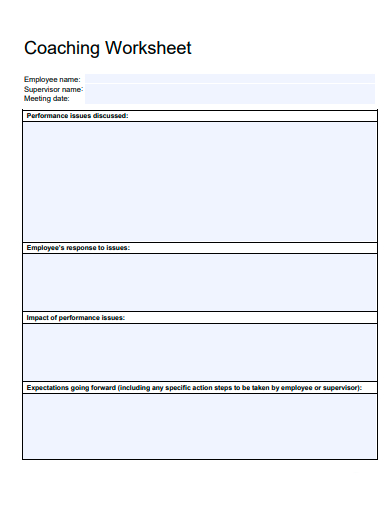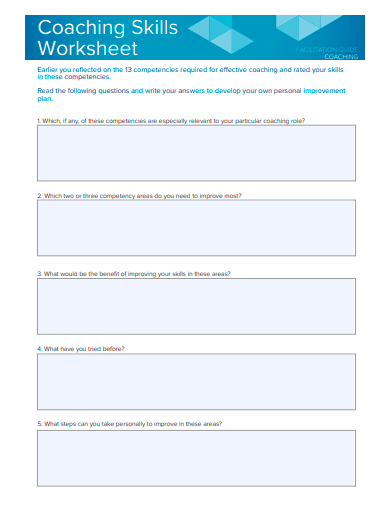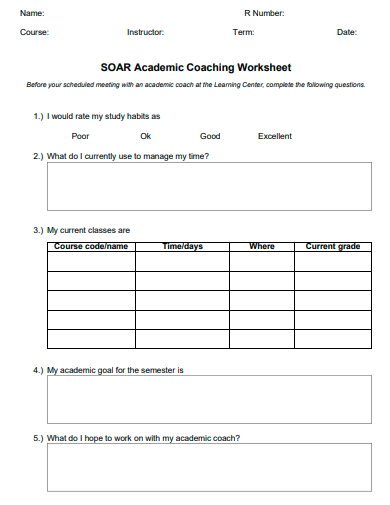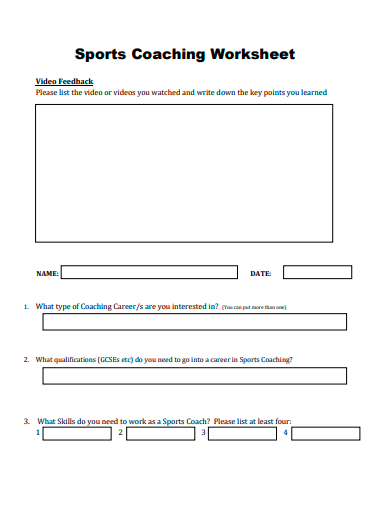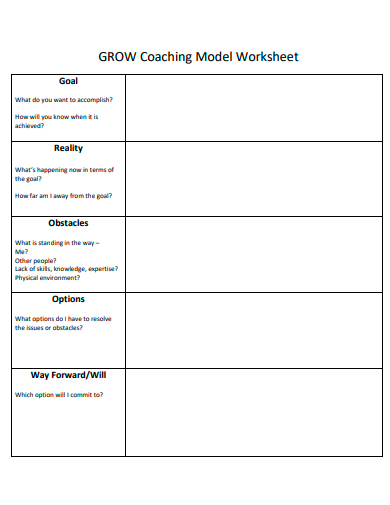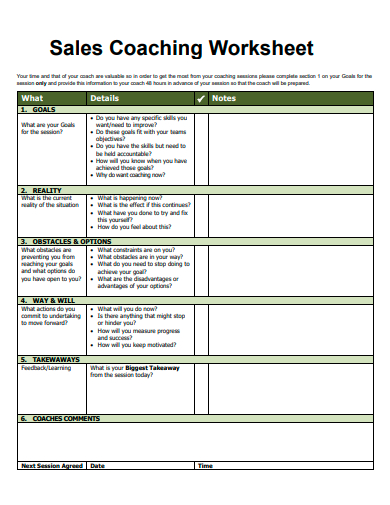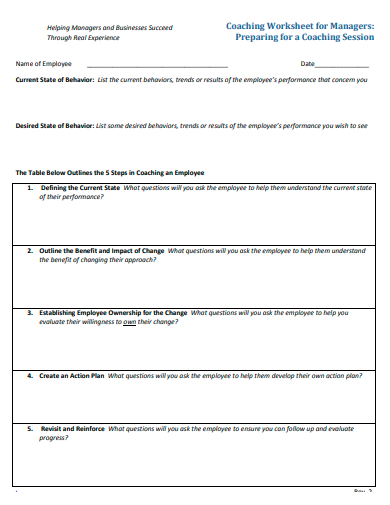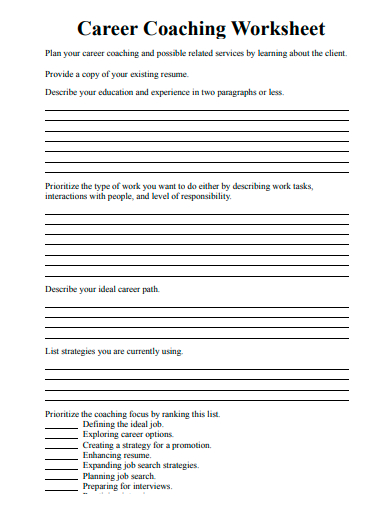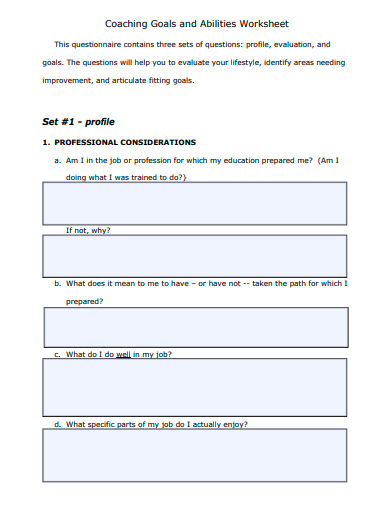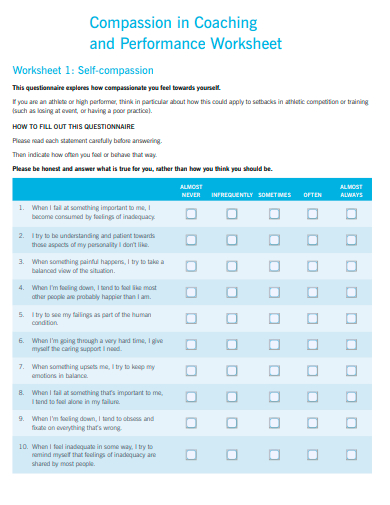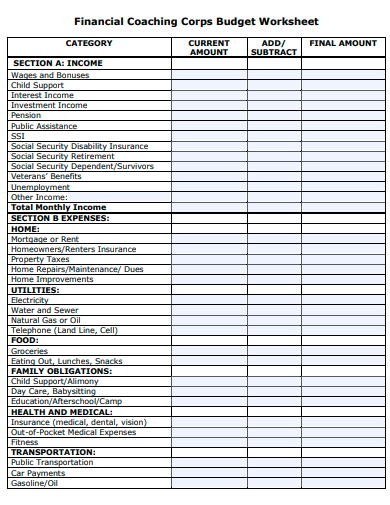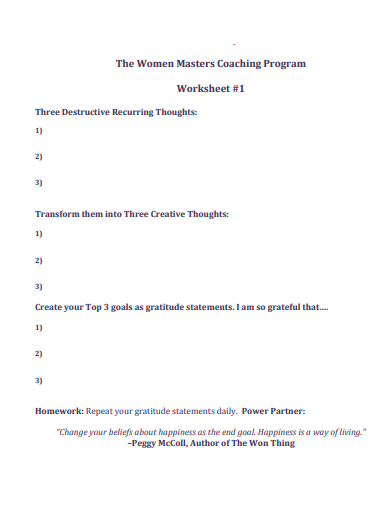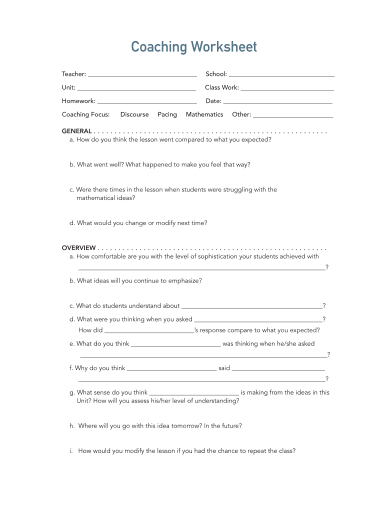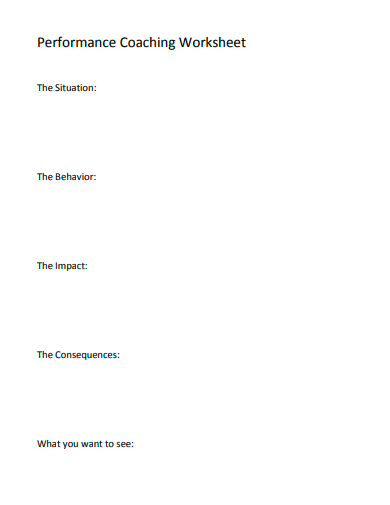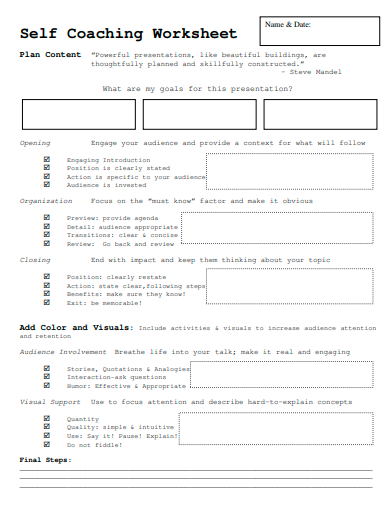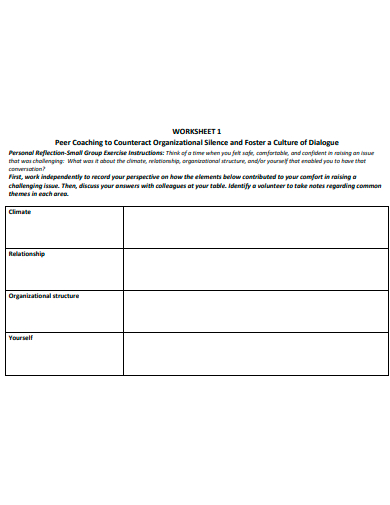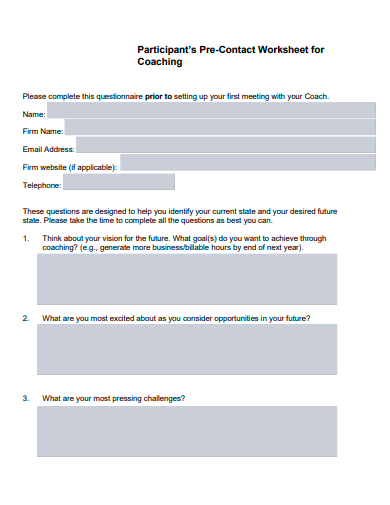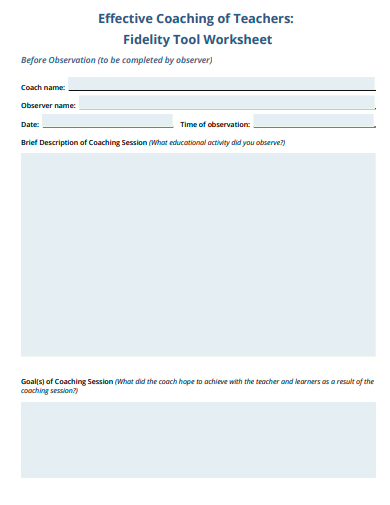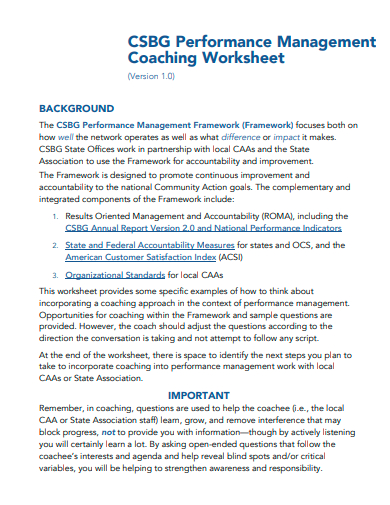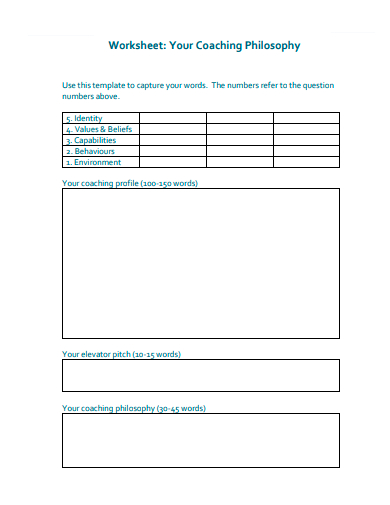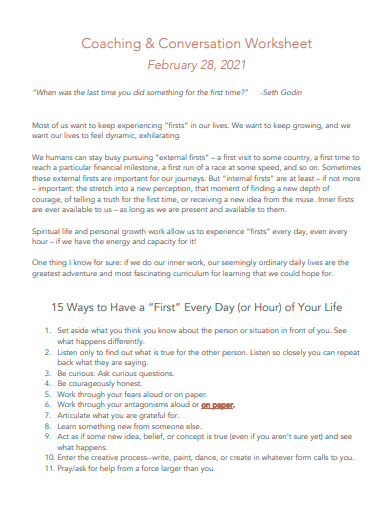Ready to catalyze your personal growth? Dive into our Sample Coaching Worksheet Template. Crafted for those passionate about self-improvement, this resource harnesses the best of coaching methodologies to propel you towards your aspirations. With its emphasis on actionable insights, this template becomes an indispensable partner in your journey. Embrace structured planning and intuitive coaching, and watch your goals come into clearer focus
20+ Coaching Worksheet Samples
1. Coaching Worksheet Template
2. Sample Coaching Skills Worksheet Template
3. Academic Coaching Worksheet Template
4. Sample Sports Coaching Worksheet Template
5. Coaching Model Worksheet Template
6. Sample Sales Coaching Worksheet Template
7. Coaching Worksheet For Managers Template
What is a Coaching Worksheet?
In the realm of personal and professional development, a coaching worksheet is an invaluable tool designed to facilitate self-reflection, goal setting, and action planning. Often employed by life coaches, business mentors, therapists, and educators, these worksheets serve as structured guides that help individuals explore their thoughts, feelings, and behaviors in specific contexts. Let’s delve deeper into the essence, benefits, and components of a coaching worksheet.
Essence of a Coaching Worksheet
At its core, a coaching worksheet is a structured document or template that prompts an individual to introspect on certain aspects of their life or work. Depending on its intended purpose, a worksheet can cover a myriad of topics ranging from career aspirations, personal strengths and weaknesses, to emotional triggers and response patterns.
The primary objective is to provide a focused space where individuals can articulate their thoughts, analyze their present circumstances, identify potential barriers, and chart a way forward.
Benefits of Using a Coaching Worksheet
Enhanced Self-awareness: One of the foundational aspects of personal growth is self-awareness. By methodically answering the questions and prompts in a worksheet, individuals gain a deeper understanding of their motivations, preferences, and areas of improvement.
Goal Clarification: With myriad aspirations buzzing in the mind, it’s easy to get overwhelmed. A coaching worksheet provides a structured approach to distill these aspirations into clear, achievable goals.
Actionable Steps: Beyond just goal-setting, these worksheets assist in breaking down broad goals into actionable steps or tasks, making the journey to achievement more feasible and less intimidating.
Accountability: Documenting aspirations, challenges, and plans on paper often provides a tangible sense of commitment. Many individuals find it easier to remain accountable to their goals when they’ve outlined them in such a concrete manner.
Tracking Progress: As individuals advance in their journey, revisiting completed worksheets can offer insights into the progress made, challenges overcome, and areas that still require focus.
Key Components of a Typical Coaching Worksheet
Introspection Prompts: These are open-ended questions designed to encourage deep reflection. Examples might include, What are the core values that drive your decisions? or Describe a recent situation where you felt out of your comfort zone.
Goal-setting Section: Here, individuals are encouraged to outline their short-term and long-term goals, ensuring they’re specific, measurable, achievable, relevant, and time-bound (often referred to as SMART goals).
Action Plan: This section is dedicated to breaking down goals into actionable steps. It often includes prompts for identifying resources needed, potential barriers, and strategies to overcome them.
Feedback & Reflection: After action, it’s crucial to reflect on the outcomes. This section encourages individuals to assess their progress, learn from their experiences, and adjust their strategies if needed.
A coaching worksheet is a dynamic tool that fosters introspection, clarity, and actionable change. Whether you’re a coach looking to empower your clients or an individual committed to self-growth, integrating such worksheets into your development arsenal can lead to profound insights and tangible progress.
8. Career Coaching Worksheet Template
9. Sample Coaching Goals and Abilities Worksheet Template
10. Coaching and Performance Worksheet Template
11. Financial Coaching Corps Budget Worksheet Template
12. Women Masters Coaching Program Worksheet Template
13. Sample Coaching Worksheet Template
The 5 Basic Elements of a Coaching Session
A successful coaching session is more than just a conversation; it’s a structured interaction that seeks to guide the coachee toward self-awareness, clarity, and actionable steps. To achieve this, there are five fundamental elements that underpin most coaching sessions, regardless of the context or specific coaching niche. Let’s explore these foundational elements in detail.
Rapport Building and Setting the Atmosphere
Before any meaningful coaching can occur, it’s paramount that the coach and coachee establish a strong sense of trust and rapport. The coaching environment, whether it’s a physical space or a virtual setting, should be conducive to open dialogue, free from distractions and interruptions.
Purpose: To create a safe and non-judgmental space where the coachee feels comfortable sharing, reflecting, and exploring.
Techniques: Active listening, open body language, maintaining eye contact, and displaying genuine empathy and interest.
Setting and Clarifying the Agenda
Each coaching session should have a clear focus. While the overarching goal of the coaching engagement might be known, the specific agenda for an individual session needs to be defined.
Purpose: To provide direction to the session and ensure both the coach and coachee are aligned in their objectives.
Techniques: Asking open-ended questions like What would you like to achieve by the end of this session? or What’s the most pressing issue you’d like to discuss today?
Exploration and Discovery
This is the core of the coaching session, where the majority of the dialogue takes place. During this phase, the coach employs a range of questioning techniques to help the coachee explore their thoughts, feelings, beliefs, and perceptions.
Purpose: To delve deep into the coachee’s experiences, challenges, aspirations, and potential barriers, facilitating self-awareness and insights.
Techniques: Powerful questioning, reflective listening, and tools like the GROW model (Goal, Reality, Options, Way Forward) to structure the exploration.
Action Planning
Insight without action often leads to stagnation. Thus, every coaching session should transition from exploration to defining actionable steps that the coachee can undertake.
Purpose: To transform insights and reflections into tangible actions, creating momentum and progress.
Techniques: Helping the coachee define SMART goals (Specific, Measurable, Achievable, Relevant, Time-bound), identifying resources, and anticipating potential obstacles.
Review and Closure
As the session draws to a close, it’s essential to review the discussions, commitments, and ensure the coachee leaves with clarity.
Purpose: To consolidate learning, reaffirm commitments, and provide a sense of completion to the session.
Techniques: Summarizing key points, revisiting the session’s goals, and setting expectations for the next session or actions to be taken.
While the specifics of a coaching session can vary based on the coaching niche, methodology, and individual needs, these five elements provide a robust framework. When executed well, they ensure that each session is productive, purposeful, and transformative for the coachee.
14. Performance Coaching Worksheet Template
15. Sample Self-Coaching Worksheet Template
16. Coaching Worksheet in PDF
17. Participants Coaching Worksheet Template
18. Sample Coaching of Teachers Worksheet Template
19. Performance Management Coaching Worksheet Template
20. Coaching Philosophy Worksheet Template
21. Coaching and Conversation Worksheet Template
When Would You Use a Coaching Worksheet?
A coaching worksheet is an instrumental tool in the field of personal and professional development. It provides structure, facilitates reflection, and aids in creating actionable steps towards growth. The utility of such worksheets is vast, making them suitable for various scenarios and objectives. Let’s delve into some instances when one would employ a coaching worksheet.
Goal Setting and Clarification
Often, individuals have a nebulous sense of what they want but struggle to define it in concrete terms. A coaching worksheet designed for goal-setting helps streamline and focus these aspirations.
Scenario: A young professional wants to ascend the corporate ladder but isn’t sure how. A worksheet can help break down this overarching aim into tangible milestones and actionable steps.
Overcoming Challenges or Obstacles
Life is fraught with challenges. Whether it’s a personal hurdle or a professional impediment, a coaching worksheet can provide the space to dissect the issue, understand its roots, and devise strategies to navigate or overcome it.
Scenario: An individual feels stuck in a routine and struggles with procrastination. A worksheet can assist in pinpointing the triggers, patterns, and possible solutions.
Skill Development
As individuals grow and evolve, there’s often a need to acquire or hone specific skills. Worksheets tailored for skill development can guide the coachee in understanding their current proficiency level, areas of improvement, and strategies to enhance the said skill.
Scenario: A manager wishes to improve their communication skills. A worksheet can offer exercises, reflection prompts, and resources to aid this journey.
Career Transition
Career shifts, whether lateral or entirely new fields, come with their sets of uncertainties and questions. Coaching worksheets designed for such transitions can provide clarity, direction, and confidence.
Scenario: A journalist considering a switch to public relations might benefit from a worksheet that helps map out the transferable skills, potential challenges, and steps to make the transition smoother.
Personal Growth and Self-awareness
Self-awareness is the cornerstone of personal growth. Coaching worksheets designed for introspection and self-discovery can be incredibly enriching, helping individuals understand themselves better and fostering growth.
Scenario: Someone embarking on a self-awareness journey might use a worksheet to explore their values, beliefs, strengths, and areas of growth.
Preparation for Important Events
Whether it’s a critical presentation, a job interview, or any significant life event, preparation is key. A coaching worksheet can guide individuals in their preparation process, ensuring they’re well-equipped and confident.
Scenario: An individual preparing for a crucial job interview might use a worksheet to articulate their strengths, anticipate questions, and formulate impactful responses.
In essence, a coaching worksheet is a versatile tool with applications across a multitude of situations. Whether one is at a crossroads, aiming for growth, or simply seeking clarity, these structured documents provide the necessary framework to introspect, plan, and act.
Related Posts
FREE 20+ Goal Setting Worksheet Samples in MS Word | Google Docs | Pages | Excel | Google Sheets | Numbers | PPT | PDF
FREE 30+ Cost Worksheet Samples in Google Docs | Google Sheets | MS Excel | MS Word | Apple Numbers | Apple Pages | PDF
FREE 50+ Assessment Worksheet Samples in PDF | MS Word
FREE 25+ Campaign Worksheet Samples in PDF
FREE 50+ Application Worksheet Samples in PDF | MS Word
FREE 10+ Distribution Worksheet Samples in PDF
FREE 10+ Family Worksheet Samples in PDF
FREE 10+ Personal Worksheet Samples in PDF
FREE 7+ Depreciation Worksheet Samples & Templates in PDF | MS Word
FREE 10+ Typing Worksheets Samples in PDF | DOC
FREE 10+ Maths Worksheets Samples in PDF | DOC
FREE 10+ 4th grade Worksheets Samples in PDF
FREE 10+ Weekly Budget Worksheet Samples in MS Word | MS Excel | Google Docs | Google Sheets | PDF
FREE 10+ Expense Worksheet Samples in PDF
FREE 10+ Investment Worksheet Samples in PDF

